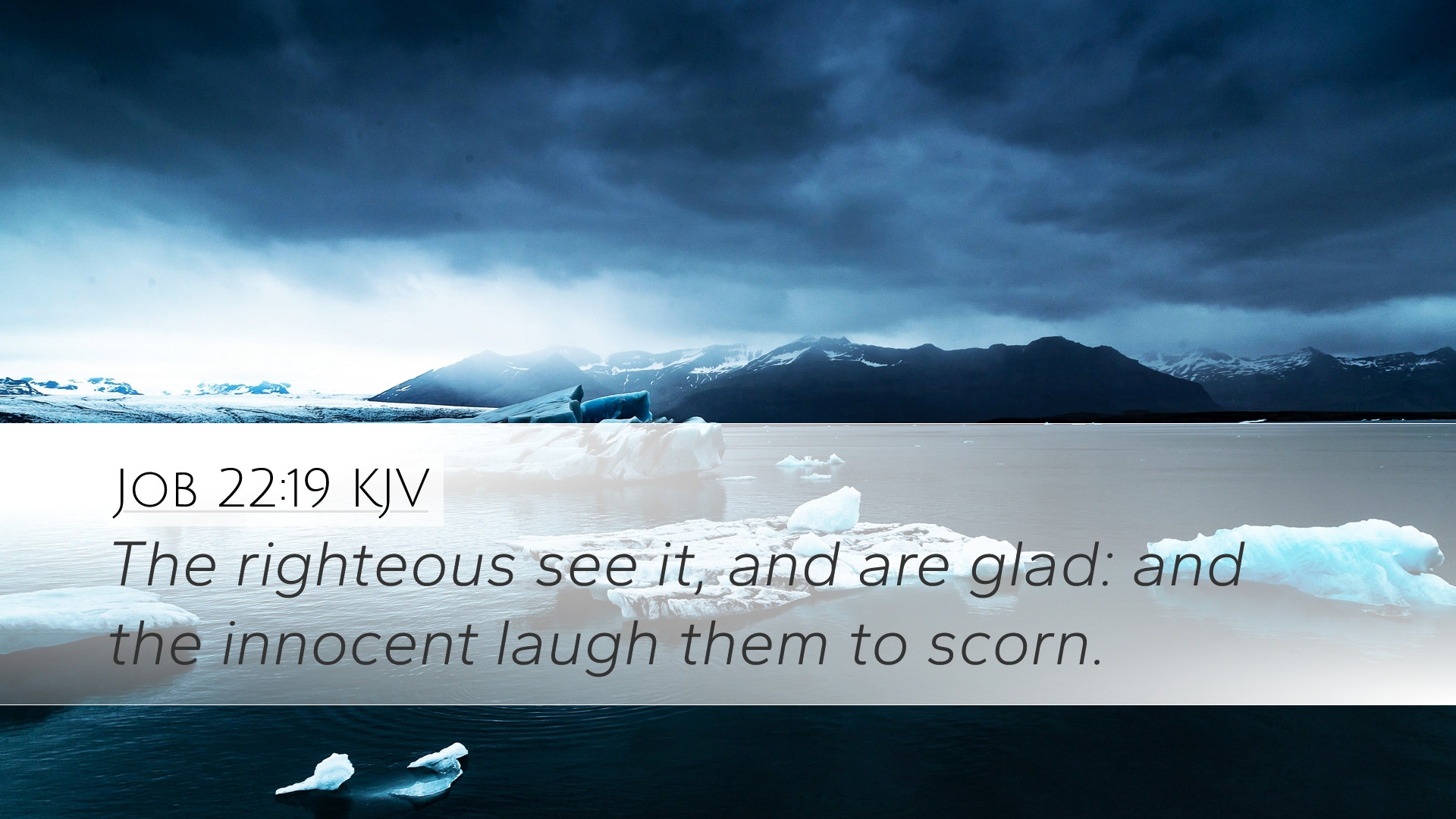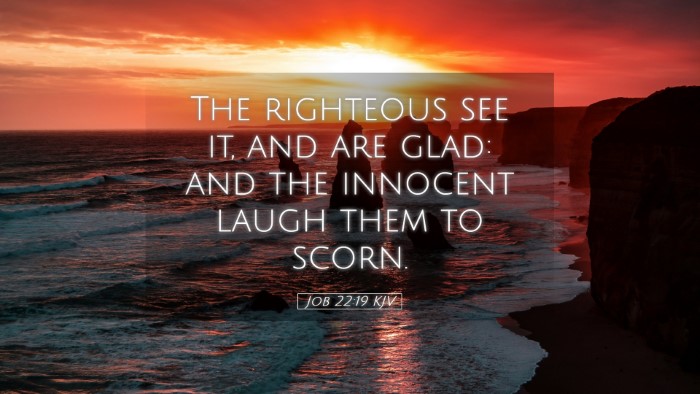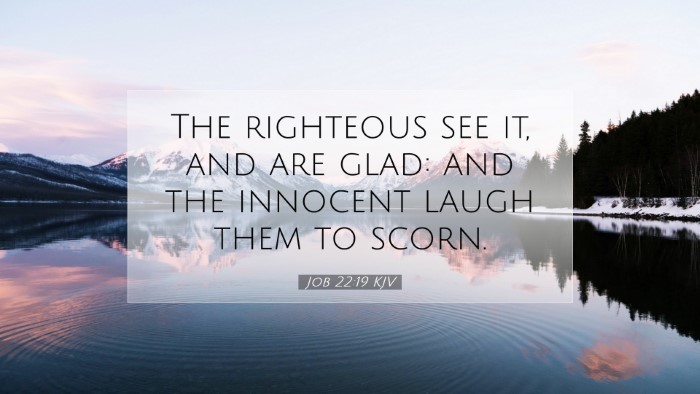Old Testament
Genesis Exodus Leviticus Numbers Deuteronomy Joshua Judges Ruth 1 Samuel 2 Samuel 1 Kings 2 Kings 1 Chronicles 2 Chronicles Ezra Nehemiah Esther Job Psalms Proverbs Ecclesiastes Song of Solomon Isaiah Jeremiah Lamentations Ezekiel Daniel Hosea Joel Amos Obadiah Jonah Micah Nahum Habakkuk Zephaniah Haggai Zechariah MalachiJob 22:19
Job 22:19 KJV
The righteous see it, and are glad: and the innocent laugh them to scorn.
Job 22:19 Bible Commentary
Commentary on Job 22:19
Verse: "The righteous see it, and are glad: and the innocent laugh them to scorn."
Introduction
The verse under contemplation presents a profound statement within the discourse of Job, reflecting on the perceived outcomes of righteousness and wickedness. In this commentary, we will draw insights from notable public domain commentaries, including those of Matthew Henry, Albert Barnes, and Adam Clarke, to provide meaningful interpretations for pastors, students, theologians, and Bible scholars.
Contextual Analysis
Job 22 is part of a larger dialogue between Job and his friends who attempt to explain his suffering. Eliphaz, one of Job's friends, speaks in this chapter, asserting that the righteous experience joy while the wicked face doom. This assertion invites a deeper examination of the nature of righteousness, suffering, and divine justice.
Eliphaz's Argument
Eliphaz begins by suggesting that Job’s misfortunes are a result of his own wrongdoing. He posits a direct correlation between one’s conduct and divine retribution, claiming that the innocent ridicule the wicked. This reflects a common theological notion of the time—that righteousness guarantees prosperity, creating a simplistic and often misleading framework for understanding suffering.
The Righteous and the Wicked
Insights from Matthew Henry: Matthew Henry emphasizes the joy of the righteous in witnessing the downfall of the wicked. He interprets this not merely as a reaction to the punishment of others but as a vindication of God's justice. The righteous find solace in the broader narrative of divine governance, which ultimately sorts out good from evil.
Insights from Adam Clarke: Adam Clarke adds depth by suggesting that the righteous laugh in scorn because they recognize the foolishness of the wicked’s ways. It is a joy rooted in the knowledge of God’s justice—the righteous find themselves secure, while the wicked are turned to shame. Clarke notes that this laughter is not malicious; instead, it is an expression of confidence in God’s ultimate justice.
Contrasting Views
Insights from Albert Barnes: Albert Barnes offers a critical perspective, questioning whether the righteous should indeed rejoice in the punishment of others. He raises valid concerns over the potential for a vindictive attitude among the faithful. Barnes encourages a deeper understanding of joy—one that reflects on grace rather than vengeance. The joy of the righteous should be rooted in God’s mercy and the hope of salvation, rather than the mere suffering of the wicked.
The Nature of Righteousness
The claim that “the righteous see it, and are glad” invites serious theological reflection on the nature of righteousness itself. While Job's friends adhere to the idea of retributive justice, the biblical narrative as a whole presents a more nuanced understanding of divine justice, one which includes mercy, grace, and the complexities of human experience.
Pastoral Application
For pastors, this verse offers a moment to teach congregants about the dual nature of joy and justice. The tendency to celebrate the downfall of the wicked can be a reflection of human frailty. It is crucial to guide the faithful towards a true understanding of joy that encourages them to seek reconciliation and restoration rather than mere retribution.
Suffering and Its Unfolding Purpose
Job's situation serves as a stark reminder that the suffering of the just does not equate to divine disfavor. The narrative as a whole portrays Job not as a sinner but as one undergoing a profound test of faith and endurance. This reality invites students and scholars to grapple with the complexities of theodicy—the justification of God in the face of evil and suffering.
Theological Implications
The verse also opens discussion on the nature of faith in the face of injustice. How should the righteous respond when the wicked appear to prosper? The answer lies in a faith that trusts God’s ultimate plan, a theme that resonates throughout Scripture. It challenges the reader to move beyond superficial understanding of justice as a transactional relationship to a deeper relationship with God characterized by trust and faithfulness.
Conclusion
In conclusion, Job 22:19 provides rich material for reflection on the interplay of righteousness and divine justice. While Eliphaz presents a traditional view that the righteous rejoice and the wicked suffer, the broader context of Job’s story compels us to pursue a more profound understanding of joy and justice that transcends mere human logic. As scholars and pastors engage with this text, they must embrace the complexity of human suffering while maintaining an unwavering hope in God’s redemptive purposes.
Final Thoughts
This passage invites us to consider our own responses to those outside the faith as well as within it. How do we reflect God’s justice and mercy in our daily lives? The righteous are called to embody the love of Christ, extending grace even amidst the failures and shortcomings of humanity.


